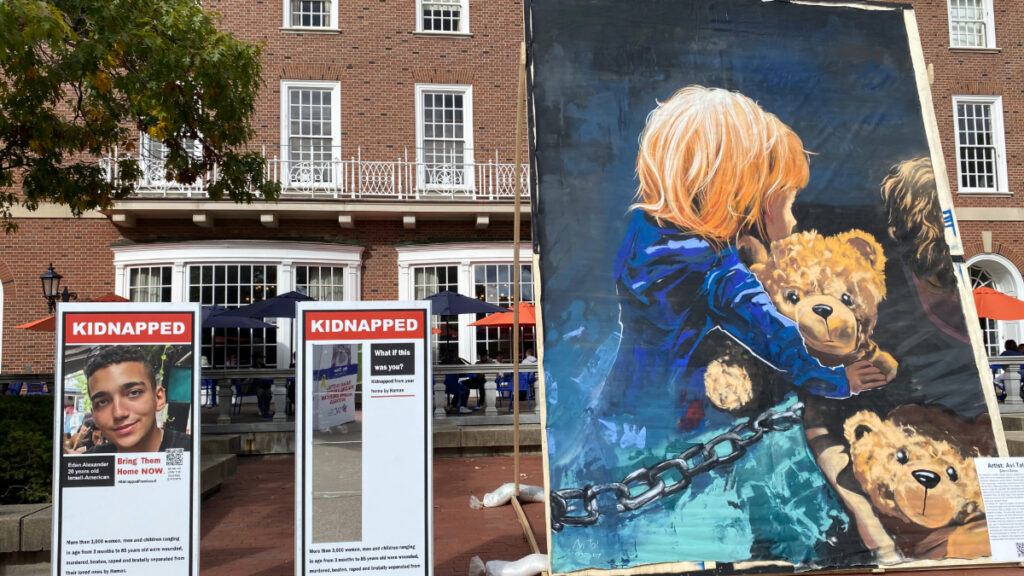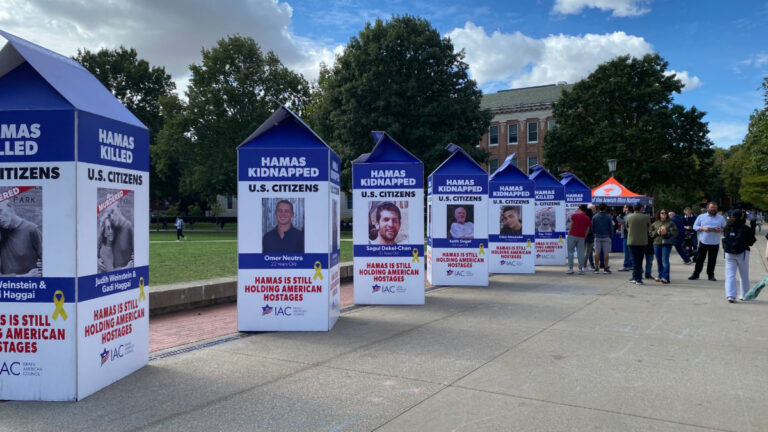A display outside of the Illini Union on the University of Illinois Urbana campus Monday featured artwork calling for awareness of Israeli hostages kidnapped by Hamas one year ago.
The exhibit was first shown during the Democratic National Convention in Chicago earlier this year. The Israeli American Council, a non-profit organization, organized it. Since then, the art installation has traveled to college campuses across the country, including Columbia University and Princeton University.
Jewish student groups on campus partnered with them to bring the exhibit to UIUC.
Rabbi Dovid Tiechtel, executive director of the Chabad Jewish Center for Campus Living, said that this display is not about politics.
“It’s not about what side people feel on, it’s simply about the human toll it’s taking,” Tiechtel said. “What’s political about hostages? What’s political about a one-year-old Kfir Bibas being kidnapped for this, just for being a Jewish kid in Israel? It doesn’t make sense.”
UIUC junior Ezra Landman-Feigelson is involved with Chabad and Hillel on campus and helped set up the displays. He spent time engaging in conversation with students curious about the artwork.
“The number of people who I’ve seen walk by whose jaws dropped was astonishing,” Landman-Feigelson said. “I had an impactful conversation with somebody before who’s like, ‘Oh, what’s this?’ and I was explaining to him, ‘There are still hostages being held in Gaza,’ and he’s like, ‘That’s still going on? I thought that was like a while ago.’ ‘No, it’s been over a year and it’s still going.’”
The displays included a line of 10-foot-tall milk cartons with photos of hostages, a sculpture of a tree titled, “The One Who Saw It All,” and mirrors asking “What if this was you?” The exhibit covered the span of Anniversary Plaza.
UIUC sophomore Emma Preston, another Jewish student who helped organize the event, said that her favorite piece on display was the spray-painted mural of a child hostage.
“I think it is a beautiful representation of something that is so tragic and awful, and it definitely gets people interested in what all this is for,” Preston said. “It’s part of this experience that people are going through that not a lot of people know about, and I think it’s a tragic yet very artistic take on it.”

A spray-painted mural by Israeli artist Avi Tal depicts a young hostage clutching a teddy bear. Next to the painting, another display with a mirror prompts viewers to imagine themselves in the situation.
Photo credit: Adelyn Mui/Illinois Student Newsroom
Each piece of artwork included QR codes linking to a website for support for Israel. Students and other community members stopped by to look at the artwork and read the descriptions.
Stuart Levy, a programmer at the National Center for Supercomputing Applications at UIUC, paused to observe the displays. Levy identifies as an American Jew, and he said he condemns last October’s attack as an atrocity, but sees the Israeli response as an even greater atrocity.
“I grieve for the people who were lost in last October’s attack, and for the hostages. I grieve for a lot of other people in Israel whose lives are being made very difficult for this,” Levy said. “But a display like this is taking one side in a conflict that’s not close to being one-sided.”
Both Preston and Landman-Feigelson said that they have felt uncomfortable on campus because of pro-Palestinian rhetoric. Landman-Feigelson said that a recent agreement between the university and the Jewish community is a step forward to protect Jewish students and their viewpoints. But he has also encountered people of opposing perspectives who don’t want to engage in conversation.
“How am I supposed to inform them? How are they supposed to learn about what’s going on?” Landman-Feigelson said. “That’s not a way to move forward. It ultimately leads to ignorance, and I witnessed ignorance leading into anti-Semitism.”
Rabbi Tiechtel said many students have come up to him and told him they feel their voices are finally being heard.
“We could spend a lot of time bickering and arguing on campus, or we could spend time spreading light and positivity,” Tiechtel said. “You don’t always have to agree with other people – it’s okay. But don’t hate other people. Today is about the human toll that’s going on.”

